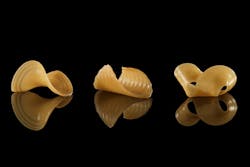3D Technology to Help Shipping Costs in Food Industry
It takes some imagination to understand what researchers at MIT have created. The new technology could transform how we both ship and eat our food.
At the Association for Computing Machinery’s 2017 Computer-Human Interaction Conference on Human Factors in Computing Systems, researchers revealed that shape-morphing creations, created via 3D printing, is “not only culinary performance art, but also a practical way to reduce food-shipping costs.”
This is how it works. A material that is similar to edible origami, in the form of flat sheets of gelatin and starch, can be submerged in water and will sprout into three-dimensional structures. These structures could in include common pasta shapes such as macaroni and rotini.
Not only is this a new way to consume food, it can save in shipping costs as the edible films can be stacked together.
“We did some simple calculations, such as for macaroni pasta, and even if you pack it perfectly, you still will end up with 67% of the volume as air,” says Wen Wang, a co-author on the paper and research scientist in MIT’s Media Lab. “We thought maybe in the future our shape-changing food could be packed flat and save space.”
The research is cutting edge. “This project is the one of the latest to materialize our vision of ‘radical atoms’ — combining human interactions with dynamic physical materials, which are transformable, conformable, and informable,” explained Hiroshi Ishii, the Jerome B. Wiesner Professor in media arts and sciences at MIT.
The researchers used a laboratory 3-D printer to pattern cellulose onto films of gelatin, but they have outlined ways in which users can reproduce similar effects with more common techniques, such as screenprinting.
“We envision that the online software can provide design instructions, and a startup company can ship the materials to your home,” Yao says.
This research was funded, in part, by the MIT Media Lab and Food + Future, a startup accelerator sponsored by Target Corp. based in Cambridge, Mass.
Note: This basis of this article is an article by Jennifer Chu for the MIT News Office.
